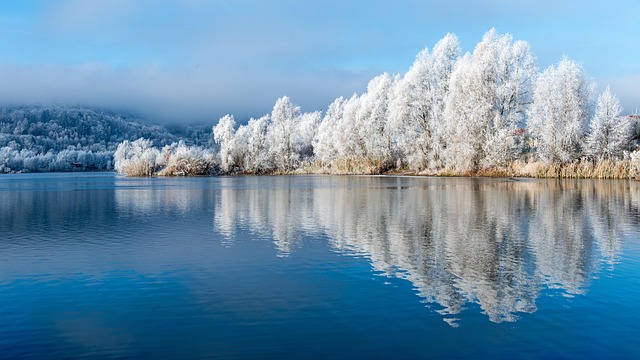Cold plunging—immersion in cold water below 59°F (15°C)—is a gaining popularity holistic method for managing stress and anxiety. This ancient practice triggers physiological responses that reduce cortisol levels, increase endorphins, and calm the nervous system, leading to improved mood and tranquility. Regular cold plunges offer significant mental health benefits, including better sleep quality, increased resilience to stress, and enhanced feelings of calm, making them a preferred choice for those seeking natural stress relief and anxiety management.
In today’s fast-paced world, finding moments of calm can be transformative. Introducing cold water immersion as a powerful tool to unlock tranquility and alleviate stress and anxiety. This ancient practice, known as the cold plunge, has gained modern popularity for its profound mental health benefits. From reducing anxiety to enhancing overall well-being, cold therapy offers a refreshing approach to self-care. Explore the science behind it and learn how to incorporate this simple yet effective technique into your calming routine for optimal relaxation.
Understanding Cold Plunge for Stress and Anxiety Relief
Cold plunging—immersing yourself in cold water—is a practice gaining recognition for its profound impact on mental well-being and stress management. Beyond its physical effects, such as improving circulation and boosting metabolism, cold water therapy has been shown to offer significant psychological benefits. The jolt of cold exposure triggers a series of physiological responses that can reduce levels of cortisol, the stress hormone, and stimulate the release of endorphins, natural mood elevators.
This ancient practice leverages the power of contrast—the sudden shift from warm to cold—to calm the nervous system. The calming effects extend beyond the initial shock, creating a lasting sense of tranquility and resilience against daily stressors. Incorporating regular cold plunges into your routine can serve as an effective tool in managing anxiety and cultivating a deeper sense of relaxation, making it a popular choice for those seeking holistic approaches to mental health.
Unlocking the Mental Health Benefits of Cold Water Therapy
Cold water therapy, particularly in the form of a cold plunge or immersion, has gained recognition as an effective method to unlock significant mental health benefits. The practice involves intentionally exposing oneself to cold water, often below 59°F (15°C), for a brief period, which can have profound effects on both the mind and body. For individuals struggling with stress and anxiety, cold water therapy offers a natural and powerful tool for relaxation.
The calming effects of cold plunges are well documented. When you immerse yourself in cold water, it triggers a range of physiological responses. Your body releases endorphins, often referred to as ‘feel-good’ hormones, which can reduce stress hormones like cortisol. This reaction leads to a sense of calm and improved mood. Additionally, the shock of cold water stimulates the vagus nerve, which is associated with the body’s relaxation response, further enhancing feelings of tranquility and reducing anxiety symptoms. Regular cold exposure for anxiety reduction has been linked to better sleep quality, increased resilience to stress, and a more positive overall outlook on life.
Scientific Insights into Cold Exposure and Anxiety Reduction
Cold exposure has gained significant attention from researchers due to its potential impact on mental health and stress reduction. Scientific studies have explored the effects of cold therapy, such as cold water immersion or a cold plunge, on the human body’s response to anxiety. One key insight is that cold temperatures stimulate the release of certain hormones, like norepinephrine, which can have calming effects on the mind. This process may help reduce symptoms of stress and anxiety by promoting a sense of calm and regulating emotional responses.
Additionally, exposure to cold water has been linked to increased levels of serotonin, often referred to as the ‘feel-good’ hormone, which plays a crucial role in mood regulation. The sudden immersion in cold water can also induce a state of deep relaxation, known as the ‘cold shock response’, leading to a decrease in heart rate and blood pressure. These physiological changes contribute to the overall calming effect, making cold plunges or immersions a popular practice for those seeking natural ways to manage stress and anxiety.
Incorporating Cold Water Immersion into Your Calming Routine
Incorporating cold water immersion into your calming routine can be a powerful tool for managing stress and anxiety, as well as enhancing mental health overall. Cold water therapy, often in the form of a cold plunge or ice bath, has been shown to reduce symptoms of anxiety by stimulating the release of endorphins—the body’s natural “feel-good” chemicals. The calming effects of cold plunges extend beyond physical sensations, providing a mental respite that can help clear your mind and promote relaxation.
Regular cold water exposure for as little as 10-15 minutes per day can significantly contribute to stress relief and overall well-being. This practice not only prepares the body for physical challenges but also calms the nervous system, helping you achieve a deeper state of relaxation. By integrating this simple yet effective technique into your daily routine, you can cultivate a more resilient mindset and improve your ability to cope with life’s stressors.
Incorporating cold water immersion into your daily routine can be a powerful tool to combat stress and anxiety, backed by both ancient practices and modern science. The benefits of cold plunge for mental health are well-documented, with cold water therapy shown to reduce anxiety and promote relaxation. By understanding the calming effects of cold plunges and unlocking the potential of this natural remedy, you can navigate towards a more serene mindsets and improved overall well-being. Give it a try, and let the refreshing embrace of cold water guide you towards tranquility.
